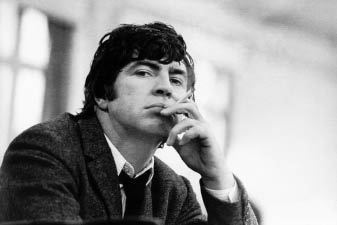Asking a resting actor to review the biography of a top producer is like asking a sheep to eat a shepherd. I was trained as a boy to hate theatrical producers by my father the actor Hugh Williams. To him they were common penny-pinching bastards.
But the photographs of Michael Codron at Oxford smouldering like Al Pacino remind me what a high percentage of the great evenings I’ve had in the theatre are down to him. Not for nothing is he known as El Codrone. Calm and benevolent, he has been in the driving seat of West End theatre for over 50 years. The title of the book itself is pleasingly ambiguous. Does it refer to his shows (plenty), his airs and graces (no more than the rest of us) or his weight (… a little)?
It is an account of Michael’s long love affair with the theatre, superbly chronicled by him and a good friend, the director Alan Strachan. Reading it is like taking an autumnal stroll with them after lunch at the Garrick. And what a 50 years it’s been. The reign of ‘Binkie’ at H. M. Tennent’s was coming to an end and the old first eleven (Coward and Rattigan et al) were on the bench.
The time had come for the French windows to be thrown open: enter Michael Codron (with no tennis racquet), a fugitive from his father’s business, a chalk quarry in Wantage. Apprenticed to Jack Hylton, he had learnt accounting and pimping; from a notorious agent the skill of negotiation: ‘She’ll ask for £5, she’s worth £2, offer her £3 and settle for £4.’ He had been a major force at OUDS. He had written sketches, played parts even — he had all the necessary qualifications.
Added to which he has the compassion and sensibility of a man who comes from two minority cultures: he is Sephardi Jewish by birth, and gay. (What a wise psychiatrist it was who told Michael’s father, ‘Whether or not I can cure your son is academic, but one thing is clear — you must let him try to do what he wants to do.’ And what a wise father Haco was to listen.)
In the 1950s the West End was crying out for such an impresario; new writers had no one to turn to, and young playgoers had no real champion. Without Codron the works of Ayckbourn, Bennett, Frayn, Gray, Hampton, Hare, Orton, Pinter and Stoppard might have languished in Binkie’s slush pile.
The index runs to 17 pages and names are liberally dropped, along with thumbnail aide-memoirs. It is a book that every theatre-going baby-boomer should have; it gives us both insight and history. I put aside the rankle that I’ve never been hired by him and that I feature only once in the book; in a Simon Gray try-out, when the cast list was beefed up for the West End, my name was dropped.
For 40 years Michael has owed me a favour. Belinda Carroll, my then girlfriend and now ex-wife, was starring in his long-running hit There’s A Girl In My Soup. During a sudden slump in business he invited us to lunch, and over coffee he casually asked us if we were planning to marry. We were. He came clean — could we announce it forthwith? He needed the publicity. The engagement photograph of the two of us looking shell-shocked on the front of the Evening Standard the next day boosted ticket sales and saved the day. Where was the quid pro quo?
Putting It On is a two-for-the-price-of-one biography because we get a bonus glimpse of Alan Strachan (let’s hope he writes an autobiography soon). The two of them clearly share a g.s.o.h. — when Michael was told that a certain actor was ‘overly ethnic’, he remarked that it sounded like a Cotswold village.
It chronicles an epic career, but it cocks no snooks and passes no judgments. Generally it is stronger on information than scandal but pearls are casually tossed in — for example, ‘Compassion has no place in an Orton play.’ And of Peter Wood: ‘We’re both fond of something slightly destructive.’
The quality of the photographs is not perfect but the story that’s weaved around them is a page-turner, a wonderful catalogue of so many milestones, so many electrifying nights at the theatre, so many memories of Michael in the background with that private smile watching the world wag. Sorry, Dad — he is actually very classy.






Comments